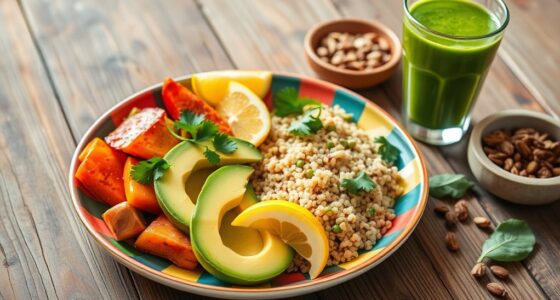The saying goes, ‘when life gives you lemons, make lemonade.’
But how long can you enjoy that fresh squeezed lemonade before it goes bad? As someone who loves to juice fresh fruits and vegetables, I know firsthand the importance of understanding the shelf life of fresh squeezed juice.
In this article, I will share with you the factors that affect the shelf life of fresh squeezed juice, how to understand expiration dates, signs of spoilage, and tips for extending the shelf life of different types of juices.
Fresh squeezed juice is a delicious and healthy way to get your daily dose of vitamins and nutrients. However, it is important to understand that the shelf life of fresh squeezed juice can vary depending on a variety of factors.
As someone who has experienced the disappointment of pouring out a once-delicious juice that has gone bad, I am excited to share with you my insights on how to ensure that your fresh squeezed juice stays fresh for as long as possible.
So, let’s get started!
Key Takeaways
- Proper storage in airtight containers is crucial to extend the shelf life of fresh squeezed juice.
- Refrigeration and consumption within 3-5 days is recommended to avoid drinking contaminated juice.
- Different container options can also help in extending the shelf life of fresh squeezed juice.
- Citrus press is an optimal tool for extracting maximum flavor and nutrition from citrus fruits.
Factors Affecting Fresh Squeezed Juice Shelf Life
You’re probably wondering how long your fresh squeezed juice will last, and there are a few factors that can impact its shelf life. One of the most important factors is the juice preservation techniques you use. If you’re making juice at home, it’s best to use a juicer that doesn’t create a lot of heat or friction, as this can cause the enzymes in the juice to break down more quickly. You should also avoid using any additives or preservatives that can interfere with the natural preservation process.
Another important factor is the storage conditions of the juice. Fresh squeezed juice should be stored in an airtight container in the refrigerator to slow down the oxidation process. If the juice is exposed to air, it will start to lose its nutrients and flavor. Additionally, you should try to drink the juice as soon as possible after it’s been squeezed, as the longer it sits, the more likely it is to spoil.
Understanding the expiration date is also important, so let’s take a closer look at that next.
Understanding the Expiration Date
When trying to decipher the expiration date, it can be helpful to know that many factors can affect how long the juice will remain safe to consume. Common preservatives used in fresh squeezed juice include citric acid and ascorbic acid, which can extend the juice’s shelf life by inhibiting the growth of harmful bacteria. However, even with preservatives, fresh squeezed juice is best consumed within a few days of being squeezed.
To ensure that your fresh squeezed juice lasts as long as possible, it’s important to store it properly. Ideally, juice should be kept in an airtight container in the refrigerator, as exposure to oxygen and warmth can cause the juice to spoil more quickly. Additionally, be sure to wash your hands thoroughly before handling the juice or any of its containers, as bacteria from your skin can transfer to the juice and cause it to spoil.
With proper storage and handling, your fresh squeezed juice should last for several days and be safe to consume.
As important as it is to understand the expiration date, it’s equally important to know the signs of spoilage.
Signs of Spoilage
If you notice any strange odors or colors in your juice, it may indicate spoilage. It is essential to pay attention to the signs of spoilage to avoid drinking contaminated juice. Spoiled juice may cause food poisoning, which can lead to severe health problems. Therefore, it is crucial to understand the ways to prevent spoilage and proper storage techniques.
To prevent spoilage, you must store fresh squeezed juice at the right temperature. The ideal temperature for storing juice is between 33-40°F. Keeping the juice in the refrigerator helps prevent the growth of bacteria that causes spoilage. Additionally, you must always use clean utensils and equipment when handling fresh juice. Proper storage techniques and cleanliness are vital to prevent spoilage and extend the shelf life of fresh squeezed juice.
With these methods in mind, you can minimize the chances of spoilage and keep your juice fresh for longer. The next section will discuss tips for extending fresh squeezed juice shelf life.
Tips for Extending Fresh Squeezed Juice Shelf Life
To extend your juice’s shelf life, store it in an airtight container. This can increase its lifespan by up to 2-3 days. Here are some storage methods and container options to consider:
-
Glass bottles with airtight lids are a great option. They don’t absorb any odors or flavors and are easy to clean.
-
Plastic bottles with tight-fitting lids are also an option. Just make sure they are BPA-free and can be recycled.
-
Mason jars with lids are a popular option. They can be reused for other purposes.
-
Vacuum-sealed bags are ideal for freezing juice. They can last up to 8 months.
Remember to always refrigerate your fresh squeezed juice and consume it within 3-5 days. By utilizing the right storage methods and container options, you can ensure that your juice stays fresh for longer.
Now, let’s dive into some tips specifically for citrus juices.
Citrus Juices
For optimal flavor and nutrition in your citrus juices, you’ll want to consider using a citrus press rather than just squeezing by hand. A citrus press allows you to extract the juice without any pulp or seeds, resulting in a smoother and more consistent texture. The pulp and seeds can make the juice bitter and cloudy, affecting the taste and appearance of your drinks.
Citrus juices are not only delicious but also packed with health benefits. They’re loaded with vitamin C, which helps boost your immune system and protect your cells from damage. They also contain other essential vitamins and minerals, such as potassium and folate.
You can use citrus juice in a variety of recipes, from refreshing summer drinks to marinades and salad dressings. But remember, freshly squeezed citrus juice can only last for a few days in the fridge, so make sure to consume it promptly.
Next, let’s talk about the shelf life of berry juices.
Berry Juices
Wow, you’re in for a treat with berry juices – they’re bursting with flavor and nutrients that’ll make your taste buds dance! Mixed berries are a popular choice for juicing because they’re rich in antioxidants, fiber, and vitamin C.
Here are some reasons why you should add mixed berry juices to your diet:
-
Boosts Immunity: Berries are known for their immune-boosting properties due to their high vitamin C content. Daily consumption of mixed berry juice can help ward off infections and illnesses.
-
Promotes Digestive Health: The fiber in berries aids in digestion and prevents constipation. Mixed berry juice can also stimulate the growth of beneficial gut bacteria, which can improve overall digestive health.
-
Lowers Risk of Chronic Diseases: The antioxidants in berries can protect the body against free radicals that cause cell damage, which may lead to chronic diseases such as cancer and heart disease.
-
Supports Healthy Skin: The vitamins and antioxidants in mixed berry juice can improve skin health and reduce signs of aging.
-
Enhances Brain Function: Berries contain compounds that can improve cognitive function and protect against age-related cognitive decline.
As you can see, mixed berry juice is not only delicious but also has numerous health benefits. However, it’s important to keep in mind that fresh-squeezed juice should be consumed within a few days to ensure maximum nutritional value.
Speaking of fresh juice, let’s move on to tropical juices.
Tropical Juices
I love tropical juices! Three of my favorites are pineapple juice, mango juice, and pomegranate juice.
Pineapple juice is packed with vitamin C and bromelain, which can help reduce inflammation.
Mango juice is also high in vitamin C and beta-carotene, which can support healthy skin and eyes.
Pomegranate juice is a great source of antioxidants and may have benefits for heart health.
Pineapple Juice
Freshly squeezed pineapple juice has a sweet and tangy flavor that can be enjoyed for up to three days when stored properly. Juice extraction is a critical step in the process of making pineapple juice. The most common way to extract juice from pineapples is through a juicer or a blender. However, using a juicer is the most efficient method as it separates the juice from the pulp and leaves behind a refreshing and healthy drink.
In terms of nutritional value, pineapple juice is loaded with vitamins and minerals including vitamin C, potassium, calcium, and magnesium. It also contains bromelain, an enzyme that aids in digestion. Drinking pineapple juice regularly can help boost the immune system, improve digestion, and promote healthy skin. As with any fresh juice, it is important to consume it within a few days to reap the full benefits of its nutritional value.
Moving on to the next subtopic, let’s talk about mango juice.
Mango Juice
Extracting juice from mangoes using a blender or juicer is a popular method, and for good reason. Not only is mango juice delicious, but it also contains numerous health benefits.
One cup of mango juice contains approximately 100% of the daily recommended intake of vitamin C, which is essential for a healthy immune system. Additionally, mango juice is a good source of vitamin A and potassium, both of which are important for maintaining healthy skin and regulating blood pressure.
If you’re looking for ways to incorporate mango juice into your diet, there are plenty of delicious recipes available online. From smoothies to cocktails to marinades, mango juice can add a tropical twist to any dish. And with its numerous health benefits, drinking mango juice regularly can help you stay healthy and energized.
Moving on to the next topic, let’s explore the benefits of drinking pomegranate juice.
Pomegranate Juice
Moving on from discussing the shelf life of mango juice, let’s talk about another delicious and healthy fruit juice – pomegranate juice. This juice is full of antioxidants and has a unique tart flavor that makes it a popular choice for making cocktails and for culinary uses.
When it comes to making cocktails, pomegranate juice is a great ingredient to have on hand. It pairs well with a variety of spirits and adds a beautiful color and flavor to drinks.
Pomegranate juice can also be used in marinades and sauces to add a tangy and sweet flavor to dishes.
In the next section, we will be discussing the health benefits of vegetable juices. These juices are packed with nutrients and can be a great way to incorporate more vegetables into your diet.
Vegetable Juices
If you’re a fan of vegetable juices, you’ll be happy to know that they can typically last in the fridge for up to 3 days. This time frame can vary depending on the juicing techniques used and the specific type of vegetable juice.
Some vegetables, like leafy greens, may have a shorter shelf life while others, like carrot and beet juices, may last a bit longer. It’s important to note that the nutritional value of the juice may decrease over time, so it’s best to consume it as soon as possible for maximum benefit.
Vegetable juices are a great way to get a concentrated dose of vitamins, minerals, and other nutrients. They can be made with a variety of vegetables, such as kale, spinach, cucumber, and celery, to name a few.
Not only can these juices provide a boost of energy and hydration, but they may also help with digestion and detoxification.
Now, let’s move on to the health benefits of fresh squeezed juice.
Health Benefits of Fresh Squeezed Juice
You’ll be amazed at how much better you’ll feel after incorporating fresh squeezed juice into your daily routine.
Not only does it taste great, but it’s also packed with essential nutrients that your body needs to function properly.
The nutrient content of fresh squeezed juice depends on the fruits and vegetables being used, but it typically includes vitamins, minerals, and antioxidants that are essential for good health.
There are different juicing methods that can affect the nutrient content of fresh squeezed juice.
For example, some juicers use high-speed blades that can generate heat and reduce the nutritional value of the juice.
Cold-pressed juicing, on the other hand, uses a hydraulic press to extract juice from fruits and vegetables without generating heat, which helps to preserve the nutrients.
Regardless of the juicing method used, fresh squeezed juice is a great way to get a healthy dose of vitamins and minerals that your body needs to thrive.
Frequently Asked Questions
Can you freeze fresh squeezed juice to extend its shelf life?
Yes, you can freeze fresh squeezed juice to extend its shelf life while preserving nutrients. Just make sure to store it in an airtight container and leave some room for expansion. Thaw in the fridge.
How does the shelf life of fresh squeezed juice compare to store-bought juices?
Store-bought juices lack the freshness and nutritional benefits of homemade fresh squeezed juice. Comparing the two, homemade juice is superior in terms of quality and benefits.
Is it safe to consume fresh squeezed juice that has been left out at room temperature?
It is not safe to consume fresh squeezed juice that has been left out at room temperature due to bacterial growth. Fresh squeezed juice has more nutritional benefits compared to pasteurized juice.
Can you mix different types of fresh squeezed juices together without affecting their shelf life or taste?
Mixing fresh squeezed juices can create delicious flavor combinations, but be mindful of juice mixing techniques. Use complementary flavors, and be cautious of over-mixing, which can affect taste.
What is the best way to store fresh squeezed juice to ensure maximum freshness and quality?
To maintain maximum freshness and quality of fresh squeezed juice, I recommend using juice preservation techniques such as refrigeration, using airtight containers, and adding citric acid. Optimal storage conditions include keeping it away from light and heat sources.
Conclusion
In conclusion, understanding the factors that affect the shelf life of fresh squeezed juice is crucial in ensuring that it’s consumed while still safe and nutritious.
By paying attention to the expiration date, signs of spoilage, and following tips for extending its shelf life, you can enjoy the health benefits that come with consuming fresh squeezed juice.
Did you know that Americans consume an average of 167 liters of fruit juice per person each year? That’s a lot of juice!
With such a high consumption rate, it’s important to be mindful of how long fresh squeezed juice can last and how to properly store it to prevent spoilage.
By taking the necessary precautions, we can continue to enjoy the delicious taste and nutritional benefits of fresh squeezed juice for longer periods of time.









